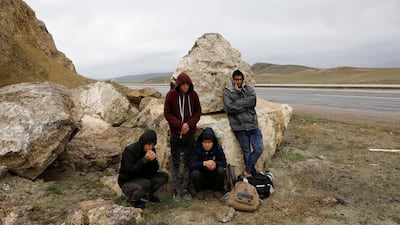The first in his life Sezar Azheer boarded a plane, he was dragged aboard against his will. The 19-year-old was in Turkey illegally and about to be deported back to Afghanistan.
Tens of thousands of Afghans have journeyed to Turkey to escape deadly violence that has engulfed the country since 2002. But Mr Azheer is one of thousands to have been recently forcibly returned to the war-torn country by Turkish authorities.
Stuck with increasing numbers of undocumented foreigners who are increasingly unable to proceed on migrant trails to Europe, Turkish authorities have been quietly implementing a policy of deporting Afghans, signalling a clear shift from its previously warm reception of refugees.
Mr Azheer was stopped in May in the Turkish city of Yalowa and found to have no legal papers.
Once he landed, he stayed in Kabul – the deadliest city in Afghanistan – rather than return to his hometown in Ghor province, where the Taliban had threatened to kill him in 2016 unless his mother stepped down as head of the governorate.
“I told the [Turkish police] that my life is in danger and that I had proof that the Taliban was threatening my life, but they didn’t care,” says Mr Azheer, speaking by phone from Afghanistan.
Turkey has become an even more important destination for Afghans since Pakistan and Iran began expelling refugees in 2016. But between January and early April, Turkey deported at least 7,100 Afghans according to Amnesty International. Two thousand more remain in detention and are likely to be deported within weeks.
________________
Read more:
Turkey arrests controversial televangelist and 'cult' leader Adnan Oktar
Turkey elections: Recep Tayyip Erdogan wins, but what lies ahead for the country?
Beyond the Headlines podcast: Turkey's future under an empowered Erdogan
________________
Turkish officials acknowledge the uptick in removals, saying that most Afghans are illegal migrants that are transiting to Europe.
But rights groups accuse Turkish authorities of preventing new arrivals from making asylum claims that would give them the temporary right to remain and forcing them to sign 'voluntary' deportation orders.
In Turkey, asylum seekers are assigned a host city where they are obliged to stay until their cases are processed. These are usually far from urban centres such as Istanbul or Ankara.
Afghans like Mr Azheer were deported for leaving their assigned cities as he, like many stuck with few opportunities in rural areas, migrated to be part of a larger Afghan community and to look for work.
Unlike the 3.5 million fleeing the Syrian conflict who have found refuge in Turkey, Afghans are far less likely to be treated as refugees
But the country remains too dangerous to return asylum seekers to, says Amnesty International. In the first three months of 2018, the UN recorded 763 civilian deaths in the country.
The speed of deportations suggests a new blanket policy to remove Afghans, said deputy director of Amnesty International for South Asia Omar Waraich. “[Amnesty] has a lot of sympathy for Turkey for being the largest refugee host in the world, but their mass deportations of Afghans seems to be ruthless,” he said. “After earning so much moral prestige by hosting [3.9 million] refugees, Turkey’s deportation of Afghans is actively squandering it.”
Turkey’s Internal Directorate for Migration Management denies it has adopted a policy targeting all Afghans and an advisor said all refugees have fair access to asylum procedures. The advisor also denied reports that border patrols were coercing Afghans to sign deportation orders.
“That’s just a rumour,” said the advisor, who identified himself as Mr Bakir. “All illegal migrants have access to a translator once they are caught and can ask for international protection.”
However, police officers have wide powers that allow them to report migrants either as illegal aliens or asylum seekers. Several local asylum groups, which aren’t authorised to speak to the press, say that decision is often made arbitrarily.

Gulagha Mayil, a young Afghan who is also living in Yalova, said police were preparing to deport him after catching him outside his assigned city. They changed their minds after he showed a video of the Taliban stoning his niece to death. She was killed, he said, for planning to elope with a man.
Mr Mayil later obtained a six month residency permit to remain in Turkey, but fears authorities won’t renew it. He now plans to hire a smuggler to take him to Europe and plans to leave in the coming days.
If he’s caught, he’ll be returned to Turkey by European authorities. In March 2016, Turkey agreed to take back migrants entering the European Union in exchange for looser visa regulations for Turkish citizens and 3 billion euros.
“Afghans have nowhere to go,” said Mr Mayil. “Turkey isn’t safe and many of us don’t know what might happen if we stay here.”

